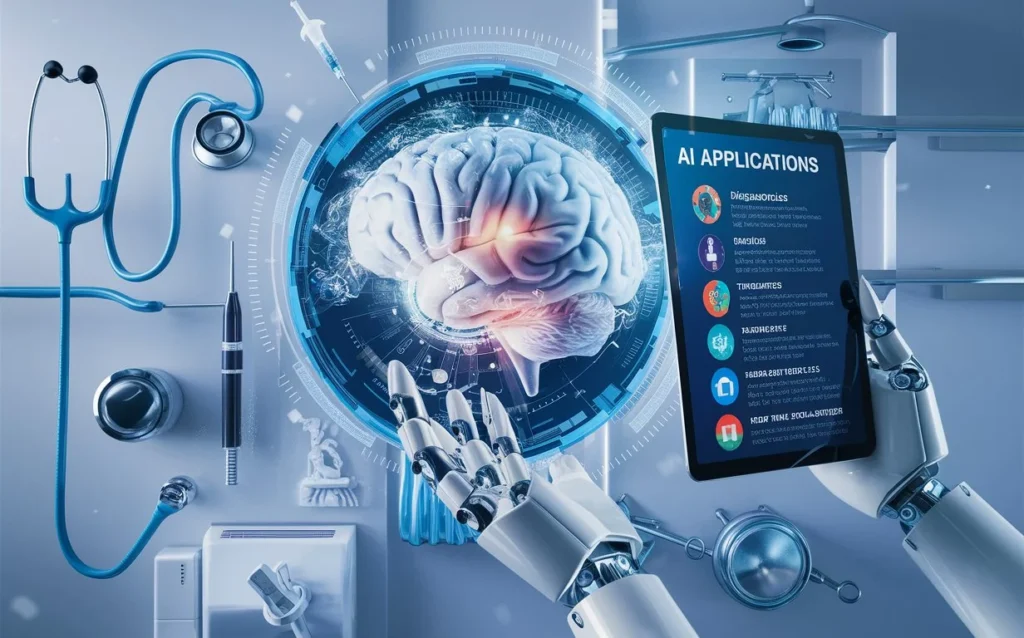
Artificial Intelligence (AI) is revolutionizing various sectors, and healthcare is no exception. As AI technologies continue to advance, they offer unprecedented opportunities to improve patient care, streamline processes, and reduce costs. Whether you’re a healthcare professional, patient, or tech enthusiast, understanding the role of AI in healthcare is crucial. Here’s what you need to know.
Table of Contents
Opportunities: What Can AI Do in Healthcare?
AI is opening up numerous possibilities in healthcare. From enhancing diagnostic accuracy to personalizing treatment plans, AI can analyze vast amounts of medical data faster and more accurately than humans. It also aids in early disease detection, predicting patient outcomes, and even in the development of new drugs. The automation of routine tasks allows healthcare providers to focus on more complex and critical aspects of patient care.
Role in Healthcare: How is AI Involved in Healthcare?
AI is already playing a significant role in various aspects of healthcare. It assists in clinical decision-making, medical imaging, and patient management. AI-powered tools help doctors analyze medical images, predict disease progression, and provide evidence-based treatment recommendations. Additionally, AI is being used in administrative tasks like scheduling, billing, and even in patient communication through chatbots.
Examples: How is AI Used in Healthcare Treatment?
AI is being used in several innovative ways to improve healthcare treatments:
- Cancer Treatment: AI algorithms can analyze medical images to detect tumors at an early stage, allowing for timely intervention.
- Cardiology: AI models predict the risk of heart attacks by analyzing patient data such as EKG readings and medical history.
- Robotic Surgery: AI-driven robots assist surgeons in performing precise, minimally invasive procedures, reducing recovery times for patients.
- Mental Health: AI chatbots provide cognitive-behavioral therapy (CBT) and other mental health support, offering immediate assistance to those in need.
Overview: What is Artificial Intelligence in Healthcare?
Artificial Intelligence in healthcare refers to the use of advanced algorithms and machine learning models to mimic human intelligence in analyzing complex medical data. AI in healthcare includes technologies like natural language processing (NLP), robotics, and machine learning, all aimed at enhancing patient care, improving diagnostic accuracy, and making healthcare more efficient.
Importance: Why is AI Important in Healthcare?
AI is crucial in healthcare for several reasons. It helps reduce the likelihood of human error in medical diagnosis and treatment, enhances the efficiency of healthcare delivery, and offers personalized care tailored to individual patient needs. By analyzing large datasets, AI can identify trends and patterns that might go unnoticed by humans, leading to better public health strategies and more effective treatments.
Future: What is the Future of AI in Healthcare?
The future of AI in healthcare is filled with potential. As AI technology continues to evolve, we can expect more advanced and personalized treatments, early detection of diseases through predictive analytics, and even preventive healthcare strategies. AI will likely play a crucial role in reducing healthcare costs, improving access to care, and driving innovation in medical research. However, addressing challenges like data privacy, ethical concerns, and the need for regulatory frameworks will be essential to fully realizing AI’s potential.
Types: What Are the Types of AI in Healthcare?
AI in healthcare can be classified into several types:
- Machine Learning (ML): Used in predictive analytics, ML algorithms learn from medical data to make accurate predictions or decisions.
- Natural Language Processing (NLP): Enables machines to understand and process human language, useful in analyzing patient records and facilitating communication.
- Robotics: AI-powered robots are used in surgeries, rehabilitation, and patient care, offering precision and efficiency.
- Expert Systems: These systems simulate the decision-making abilities of human experts, providing support in clinical decision-making.
Impact on Healthcare: How Will AI Affect Healthcare?
AI’s impact on healthcare is profound. It is expected to improve patient outcomes by providing more accurate diagnoses and personalized treatment plans. AI will also make healthcare more accessible by reducing costs and expanding services to underserved populations. The integration of AI in healthcare is likely to lead to more efficient healthcare systems, better resource management, and enhanced patient experiences.
Common Uses: Where Can AI Be Used in Healthcare?
AI is already being used in various healthcare settings:
- Diagnostic Imaging: AI enhances the accuracy of interpreting MRI, CT scans, and X-rays.
- Drug Development: AI accelerates the discovery of new drugs by predicting the interactions between compounds and human biology.
- Telemedicine: AI-driven tools assist in virtual consultations, providing doctors with data-driven insights for better patient care.
- Mental Health Support: AI chatbots offer immediate mental health support and guidance, making care more accessible.
Conclusion
Artificial Intelligence is not just a buzzword; it is a transformative force in healthcare. By harnessing the power of AI, healthcare providers can offer more personalized, efficient, and effective care. As AI continues to evolve, its role in healthcare will only expand, bringing about a future where healthcare is more accessible, affordable, and tailored to individual patient needs. Understanding AI’s current applications, potential, and future is essential for anyone interested in the intersection of technology and healthcare.
